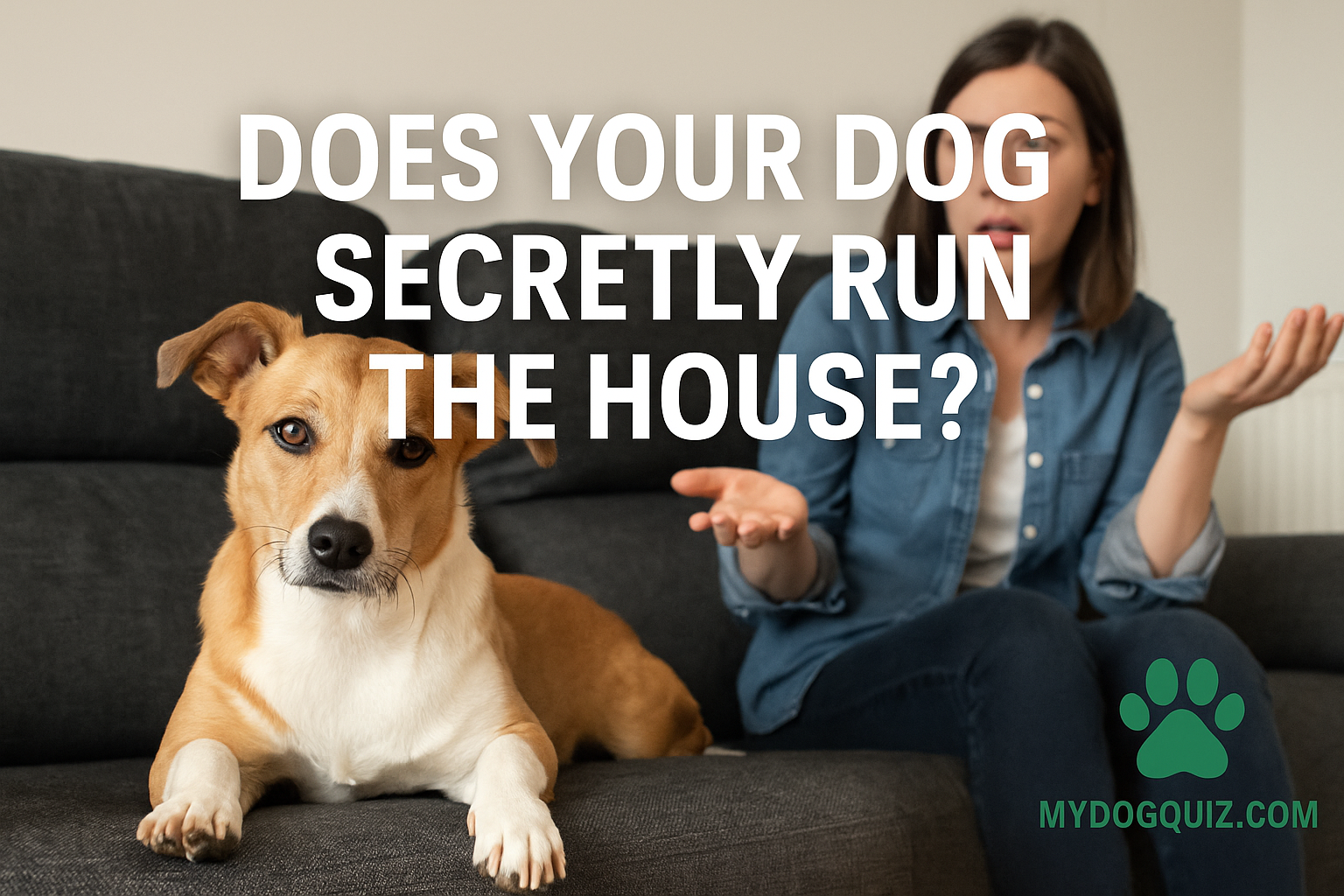Let’s be honest — in your home, who’s really in charge?
If you have to walk around your dog to get to the couch…
if you apologize when they steal your spot in bed…
if they ignore your “no” like it’s a suggestion — then you might not be the one running things.
Don’t worry — you’re not alone. Thousands of loving dog owners discover (usually the hard way) that their adorable companion has quietly taken over the house.
But the good news? Once you understand why it happens, you can take back leadership — calmly and kindly.
👉 Take the 30-Second Dog Quiz to see if your dog is the boss or the best-behaved companion you’ve always wanted.
1. The Sneaky Signs Your Dog’s in Charge
It rarely happens overnight. It’s a slow takeover.
Here’s how it often begins:
- They refuse to move from your favorite chair.
- They “decide” when walks happen.
- They stare at you during dinner until you cave in.
- They bark when you talk on the phone — because how dare you focus on someone else?
Sound familiar?
These behaviors seem cute at first, but what’s really happening is your dog is training you. Every time you react — whether by laughing, feeding, or even scolding — your dog’s brain learns: “That worked!”
The next time, they’ll do it again — only louder or sooner.
2. Why It’s Not Your Fault
Let’s clear this up: your dog isn’t “bad.”
They’re simply a genius when it comes to learning what gets results.
Dogs are wired to read humans — tone, gestures, eye contact — and they learn patterns faster than we realize.
When they see that certain actions (like whining, pawing, or barking) lead to rewards or attention, they file it away like a mental shortcut.
It’s not manipulation — it’s survival intelligence.
You’ve just been outsmarted by a four-legged psychologist.
3. Leadership Isn’t About Control — It’s About Calm Direction
Dogs naturally look for a leader — not a drill sergeant, but someone who provides calm structure. When that leadership isn’t clear, they step in to fill the role.
The result? A house full of barking, begging, or boundary-testing.
The trick isn’t to dominate your dog. It’s to communicate leadership through consistency and brain engagement.
That means less shouting, more understanding. Less punishment, more direction.
👉 Find out your dog’s “dominance style” with our 30-Second Dog Quiz.
You’ll see whether your dog is a natural leader, a follower, or a negotiator — and get quick tips to rebalance your relationship.
4. The Hidden Power of “Brain Training”
Certified trainer Adrienne Farricelli discovered something game-changing:
When a dog’s brain is challenged the right way, obedience becomes automatic.
Instead of forcing obedience, you activate focus.
Instead of “sit or else,” it becomes “sit because I want to.”
It’s all about engaging their thinking brain instead of their reactive brain — and the results are stunning.
Dogs who used to ignore commands start responding with excitement.
Barkers become calmer.
Pullers stop fighting the leash.
That’s the foundation of Brain Training for Dogs — the same method behind this quiz.
5. Quiz Teaser: Which Type of Dog Runs Your House?
Take a look at these 3 dog “personalities.” Which sounds most like yours?
🧠 The Smart Strategist
Figures out how to open doors, unwrap treats, and manipulate you with those eyes.
Needs constant mental challenges to stay balanced.
💖 The Emotional Influencer
Loves affection but knows how to guilt-trip you into giving more.
Responds best to calm structure and reassurance.
⚡ The Playful Boss
Full of energy, always testing limits.
Needs short bursts of focused training and brain games to learn self-control.
Once you know which one your dog is, you’ll know exactly how to train them — and how to reclaim your couch.
👉 Take the 30-Second Dog Brain Quiz Now
6. Why Scolding Never Works (and What Does)
When you scold your dog for ignoring you or breaking rules, you’re not teaching — you’re confusing.
Dogs don’t associate punishment with past actions. They associate it with you in the moment. That can make them anxious or even rebellious.
What works better is redirecting their brain:
- Reward focus, not just obedience.
- Turn “don’t do that” into “do this instead.”
- Keep sessions short, fun, and rewarding.
It’s the same principle used in Brain Training for Dogs, which transforms frustration into curiosity — and curiosity into calm behavior.
7. A Quick Story: How Molly Lost Her Throne
Molly, a 3-year-old golden retriever, was the queen of her house.
She barked for snacks, ignored commands, and claimed every sofa cushion.
Her owner, Jenna, loved her too much to enforce rules — until Molly’s behavior made guests uncomfortable.
When Jenna started using brain games instead of yelling, everything changed.
Within two weeks, Molly began listening again — not out of fear, but connection.
Jenna didn’t have to become the “alpha.” She just became the calm leader Molly needed.
8. What Happens When You Reset the Balance
When your dog knows who’s in charge — gently and consistently — your home transforms.
You’ll notice:
- Fewer outbursts
- Better focus during walks
- Easier grooming and vet visits
- More relaxed energy overall
Dogs thrive on clarity and routine.
Once their brain gets structured stimulation, the need to “run the house” simply fades.
And it all starts with understanding your dog’s learning personality.
9. Ready to Find Out Who’s Really in Charge?
You’ve probably figured out by now — your dog’s behavior isn’t random.
It’s the result of how their brain processes attention, stimulation, and emotion.
So… who’s really the boss in your home?
There’s only one way to know.
👉 Take the 30-Second Dog Quiz Now
Uncover your dog’s hidden leadership style and get instant insights on how to restore balance — with love, not force.
🦴 Final Thoughts
Your dog doesn’t want to rule the house — they just need clear direction.
Once they trust your leadership, you’ll both feel more relaxed and connected.
Start with curiosity. End with understanding.
👉 Take the 30-Second Dog Brain Quiz
It’s fun, free, and you’ll see results faster than you think.
Because the secret to a well-behaved dog isn’t dominance — it’s communication.


Leave a Reply